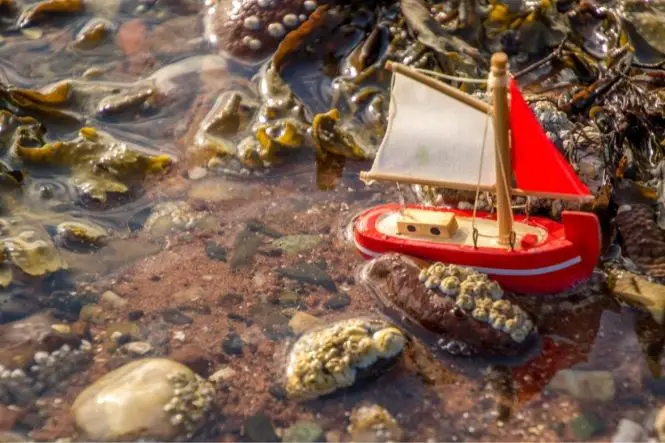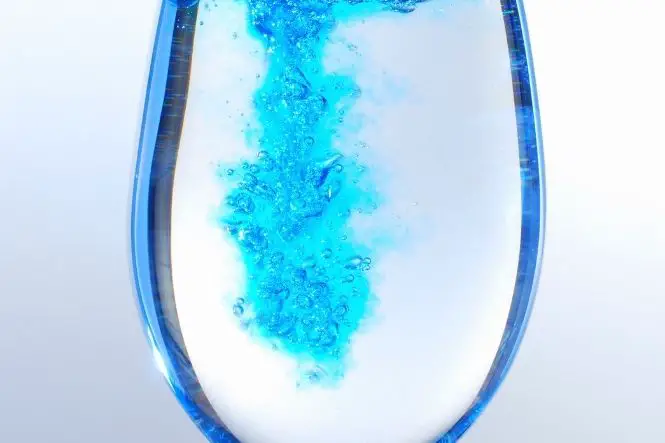Density describes how much something weighs relating to its size. For example, a cubic centimetre of cork weighs less (is less dense) than a cubic centimetre of lead (which is more dense). Density explains why some things float on water and some sink – if something is less dense than water it will float, and if it is denser than water, it will sink.
Table of Contents
Making Layers
Get three glasses, and pour cooking oil into one, golden syrup into another (it will pour more easily if it’s slightly warm) and water into the third. Drop a small piece of cork into each one – does it float or sink? Try it with three small Lego bricks, three grapes and three coins. Which float or sink?
Take out the objects, and wash and dry them. Pour water into a clean glass until it is about a third full, and then carefully pour into some golden syrup. Does it float on the water, or sink below? Now pour in a layer of oil – where does it end up? Guess what will happen if you carefully drop in a piece of cork, a Lego brick, a grape and a coin. Add an ice cube – where does it start and what happens when it melts? Put things in order of density.
The cork is less dense than any of the liquids, so it will float on everything. The Lego brick should sink through the oil, but float on the water and syrup. The grapes should sink through the oil and water, but float on the syrup. The coin is denser than any of the liquids, and will sink through everything. The oil is the least dense liquid, so it will float on the water, and the syrup is the densest liquid, so it will sink below the water. Ice has a similar density to oil, and so floats within the oil, but as it melts, the water will sink to the water level.
Floating and Sinking Eggs
Put a fresh egg into a glass of water, and an older egg into another. The fresh egg should sink to the bottom and the older egg may lay at an angle or even float (see which way up it floats). Take the fresh egg out, add a spoonful of salt to the water and stir, and put the egg back in. Does it still sink? Keep adding salt, spoonful by spoonful, until the fresh egg floats. Which way up does it float?
As an egg gets older, liquid evaporates through the shell and the air sac gets bigger. This means the egg gets less dense and is more likely to float. The air sac is in the round end of the egg, so that is lighter (more buoyant) and floats upwards.
An egg that sinks but lays at an angle is probably about a week old, and one that stands on its end is probably about two weeks old. One that floats completely is probably off – handle it very carefully!
The fresh egg is denser than the tap water, so it sinks. Adding salt to the water makes the water denser. If there is enough salt in the water, the water becomes denser than the egg, so that the egg will float on the salt water.
Which One is Diet?
Put two cans of the same kind of drink, one sugary and the other the diet version, in a bowl of water – do they float or sink?
The sugary version will sink and the diet version will float. This is because sweeteners are much sweeter than sugar, weight for weight. It takes a greater weight of sugar than sweetener to sweeten the drink, which makes the drink denser, and stops it floating.
Cartesian Diver
Fill a two litre fizzy drinks bottle with water, drop a tomato sauce packet in (the kind you get in service station cafes) and screw on the lid. Does the packet float? If not, try a soy sauce packet, or a sweet in a small sealed packet. Squeeze the bottle – the ‘diver’ (the tomato sauce packet) should fall. Let got – the diver should rise. If it doesn’t fall and rise, try a different packet.
Air is less dense than water. Squeezing the bottle compresses any air inside the packet. As the air is compressed, it becomes denser than water, so the packet drops. Stopping squeezing the bottle allows the air to expand again. As the air expands, it becomes less dense than water and the packet rises again.







